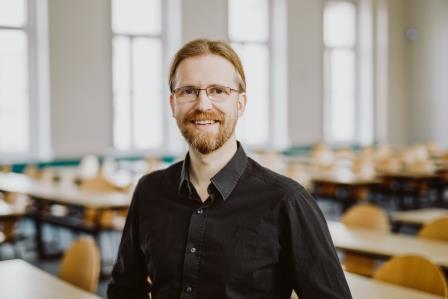Where machines learn to think

Saxony-Anhalt provides a lot of potential for the research and development of artificial intelligence
“People and machines can learn from one another and together achieve a lot more than we can currently imagine”. Prof. Dr.-Ing. Sebastian Stober thus describes his vision of the future. As a computer scientist, he was appointed Chair of Artificial Intelligence (AI) at the Otto von Guericke University in Magdeburg for the winter semester 2018/2019. His specialist area is the research and development of artificial neural networks which should understand and translate our brain signals in the medium term. An important area which significantly enhances the research competence on AI in Saxony-Anhalt.
Pioneering work: Artificial intelligence in the field of neuroscience
While AI is already making good progress in the industrial area and in human-robot cooperation and the first results are applied in practice, developments in the neuroscience area are still in their infancy. Professor Stober and his team want to do pioneering work here and improve the cognitive skills of intelligent systems. In Magdeburg, they also want to cooperate with the internationally recognised Leibniz Institute for Neurobiology. For instance for the development of neuroprostheses which are controlled via artificial neurons. The prosthesis is understood as an independent, intelligent system which communicates with the person through self-learning. Man and prosthesis should learn together and from one another, so that the almost natural fine motor skills of artificial limbs are produced ideally.
Professor Stober’s main research area is deep learning, a subfield of machine learning, in which artificial neuronal networks are trained with billions of neurons to solve more and more complex tasks. Stober uses it to understand complex systems like the brain and to artificially replicate its functionality in the form of simplified models. But the analysis of self-learning components is also significant to understand how the machine works. “It is important that we know what the systems have learned”, Stober says. “Only in this way can we comprehend possible distortions or malfunctions and avoid unpleasant surprises.”
After his studies in Magdeburg and positions in Melbourne (placement during his studies at the University of Melbourne), Canada (Brain and Mind Institute, University of Western Ontario) and Potsdam (University of Potsdam, research focus cognitive sciences), new prospects lured him back to Saxony-Anhalt. His professorship, which should act as a bridge between information technology and neuroscience, is the exact field of activity he wanted. “I am not fighting for a lost cause”, Professor Stober states happily. On the contrary. The Master’s course “Data and Knowledge Engineering” has been part of Magdeburg University’s range of studies since 2003, and the special profile “Learning Systems / Biocomputing” has also been part of the Information Technology Bachelor’s degree for a few years. Six work groups are established at the Institute for Intelligent Cooperating Systems alone, focusing their research on swarm intelligence and robotics, among other things. In the broader context of the Faculty of Information Technology, there are work groups on data and knowledge engineering or data mining. Machine learning is actively researched also in Mathematics. The interlinking with one another and the connection to engineering and humanities create very good conditions for interdisciplinary research around the topic of AI at the Magdeburg research site.
Magdeburg attracts with future prospects
For Professor Stober, the term “artificial intelligence” is misleading. In his view, machines can develop their own intelligence which is not comparable to that of humans. He sees far greater opportunities through mutual learning and shared growth than if AI was only reduced to a copy of human intelligence. He is motivated to contribute to the creation of higher intelligence, but also sees its threats, which are greatly represented in society thanks to science fiction films. “In order to use its potential for the greater good, it is strictly necessary to incorporate the humanities, and to create suitable framework conditions for research and development where the individual person does not lose their importance”, Stober says. “Because technical progress does not wait.”
Infrastructure and educational programmes support technical progress in Saxony-Anhalt
Progress in Information and Communication Technology (ICT) is also promoted in the state of Saxony-Anhalt. The ICT is an important economic and location factor with an annual turnover of over € 2.2 billion. There has been an additional funding programme for the modernisation of ICT components in the general and vocational schools of the state since 2017. Professor Stober is also involved in eLeMeNTe e.V., the state association of Saxony-Anhalt for the support of mathematically, scientifically and technically interested and talented pupils. This creates the opportunity to capture young people’s interest in these topics and train them early on. The state’s IT-specific universities (Otto von Guericke University Magdeburg, Martin Luther University Halle-Wittenberg and the universities of Anhalt, Harz and Merseburg) also train the specialists of tomorrow.
AI applications process huge amounts of data at the highest speed. The more comprehensive the database, the more versatile the application possibilities become. In this way, in medicine for instance, experience in clinical pictures, treatments or operations is gained, projected onto future cases through AI applications and enriched with new findings via self-learning systems. In Saxony-Anhalt, researchers and developers deal with AI across sectors. The Fraunhofer Institute for Factory Operation and Automation IFF in Magdeburg, for example, is researching secure human-robot collaborations with the aid of tactile sensors.
The highly secure data centre of T-Systems in the small town of Biere south of Magdeburg provides the necessary infrastructure. The Hamburg company Fuse AI, AI specialist in the area of health and medicine, hosts its highly sensitive data here, for example. According to T-Systems, the location without airports, flight corridors or nearby motorways combined with the Federal Data Protection Act is unbeatable worldwide from a security point of view.
“Saxony-Anhalt offers a lot of potential to teach machines to think and to create new intelligence”, says Professor Stober, who wants to turn his vision into a reality here.
Author: Miriam Fuchs
more on the topic:
